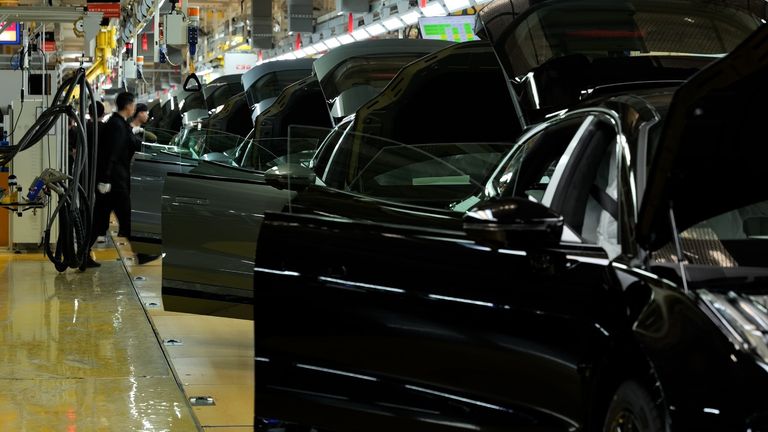Tariffs are rarely a good idea.
The imposition – or raising of tariffs – invariably invites retaliation from the country or countries whose goods or services you are targeting.
They also, invariably, hurt consumers.
Donald Trump‘s trade wars with China made for populist politics but ultimately pushed up prices for ordinary Americans. Worse still, they tended to hit poorest Americans the most.
Economic impact
They also have a damaging effect on the wider economy.
As Martin Wolf, the chief economics commentator of the Financial Times, pointed out in a column this week, tariffs hurt imports, which in turn hits demand for the currency in which those imports are denominated.
That then pushes up the value of the currency of the country that has imposed the tariffs – making the exports of that country less competitive. That, in turn, hits the exports of the country that imposed tariffs in the first place.
Mr Wolf wrote: “Exporters are the most competitive producers in the country. Protecting producers of uncompetitive import substitutes at their expense does not look sensible.”
He points out that, in the 1970s, when India imposed protectionist trade policies, its exports were eventually “crushed”, making its economy “vulnerable”.
EU action
These are the facts of life that must be borne in mind when weighing up the European Union’s plans, announced on Wednesday, to slap significant tariffs on Chinese electric vehicles (EVs) and in assessing whether the UK should follow the EU’s lead.
The EU’s tariffs, introduced in the face of opposition from Germany, vary from 38.1% on SAIC, the owner of MG, to 20% on Geely, the parent of Volvo and 17.4% on BYD, owner of brands including Dolphin and Seal.
The imposts, which are on top of an existing 10% levy on imported cars, mean that an EU citizen buying a €30,000 entry-level EV could be paying as much as €11,450 more.
China’s response
Unsurprisingly, China is not happy.
He Yadong, spokesman for the Chinese ministry of commerce, said: “It will not only damage the legitimate rights and interests of China’s electric vehicle industry, disrupt the mutually beneficial cooperation between China and Europe in new energy vehicles, but also will distort the global automotive industry and supply chains, including those of the EU.
“It is a blatant act of protectionism.”
It would be surprising were the tariffs not to be met with retaliation.
Beijing already has an anti-dumping investigation into European brandy exports under way, chiefly cognac from France, one of the prime instigators of the EU’s tariffs on Chinese EVs.
Impacts in Europe
It is easy to see how China might retaliate with tariffs of its own on a whole range of EU products in response. The EU is a big exporter of food and drink products to China and, accordingly, shares of Remy Cointreau, the world’s second-biggest cognac maker, have fallen by nearly 6% today.
Shares of Germany’s big carmakers have also fallen, most notably Volkswagen, which with its local joint venture partners sold 3.2 million vehicles in China last year. Its shares and those of Porsche – which is controlled by VW – have fallen by more than 5% apiece.
Spain, Europe’s biggest exporter of pork to China, is also looking on nervously.
Will tariffs work?
It is also by no means certain that the EU’s tariffs will even work.
Industry analysts believe that, such is the size and efficiency of the Chinese EV makers, they will probably be able to absorb some or all of these tariffs and still sell their cars profitably in the EU.
Most currently sell their cars in Europe at a significant premium to the prices they charge in their domestic market, typically twice or even three times as much, giving them plenty of scope to cut prices in the EU in response to the tariffs.
So imposing tariffs on Chinese EVs is unlikely to provide much support for European EV makers.
Chinese workarounds
And that is before Chinese EV makers respond in ways other than cutting prices. Some may base more of their manufacturing in Europe as a way of designating their vehicles EU-made.
This has already been happening in a major way: more than three-quarters of Chinese foreign direct investment in Europe last year was in battery manufacturing plants.
BYD, for example, has just unveiled plans to build a gigafactory in Hungary – another of the countries which opposed the EU’s move – while Volvo is already shifting some of its EV production from China to Belgium in order to reduce the impact of EU tariffs.
Hurting Europe
Ironically, the tariffs may also hurt European carmakers themselves. Renault, for example, makes affordable EVs under the Dacia brand in China for selling into Europe. Its Chinese joint venture partner is set to be hit by the tariffs.
For the UK, there are no obvious advantages to imposing EU-style tariffs on Chinese EVs, however tempting it may be.
China could almost certainly retaliate by hoisting tariffs on big-selling UK exports such as Scotch whisky or, as it currently accounts for 7.2% of UK car exports, UK-built cars.
The UK
Nor, given the efficiency and lower costs of Chinese EV makers, would tariffs bestow any kind of price advantage on British manufacturers. Not when, for example, MG is reportedly planning to launch a new entry-level vehicle later this year, the MG2, for around £20,000.
Tariffs seldom have the benefits their proponents claim.
They hurt consumers, cost jobs, destroy wealth and build mistrust between countries.
That would certainly be the case were the UK to follow the EU’s lead here.



